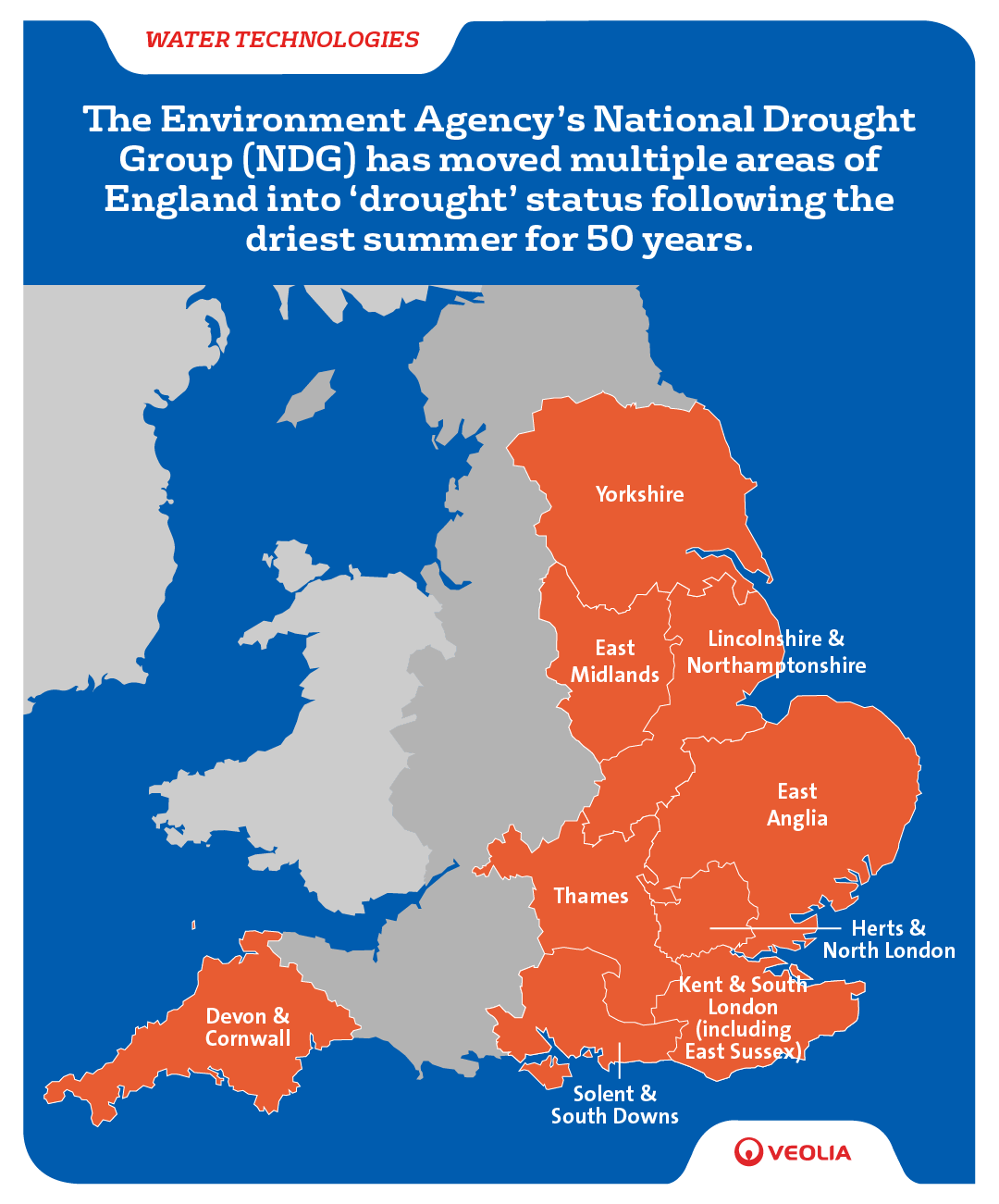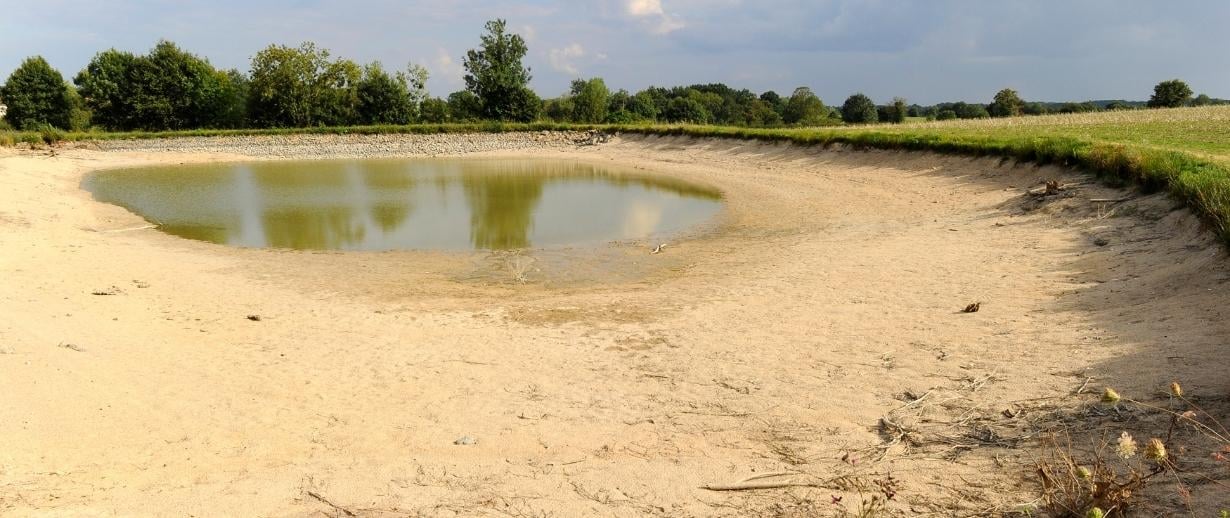The recent record-breaking heatwave in the UK has emphasised the issue of water stress. In this blog, Robert Denny, Head of Sales - Water Treatment Chemical Services, delves into the topic and offers possible solutions for industries that require high amounts of water in their processes.
In 2021, the UK Environment Agency mapped and published the regions which are expected to be affected by water stress in England.1 The areas identified below by the Environment Agency will be exposed to severe water stress situations in the future:
- London
- East of England
- South East
- Some areas in the South West
- East Midlands
- Some areas in the West Midlands.
This summer we are seeing many of these areas enter water restrictions affecting millions of households due to continued drought conditions in the UK. The Environment Agency’s ‘National Drought Group (NDG)’ met recently and have moved multiple areas of England into ‘drought’ status following the driest summer for 50 years.2 They came to this conclusion by assessing the amount of rainfall, river flows, groundwater levels, reservoir levels, and the dryness of soils. This change in categorisation was last triggered in 2018. Harvey Bradshaw, the executive director for the Environment Agency and chair of the NDG, said: “This meeting has helped to build on our coordinated action to manage water supplies, consider water users and protect the environment. We urge everyone to manage the amount of water they are using in this exceptionally dry period.”

A high proportion of UK industries are located within these areas - so it is critical that resilience plans and new approaches to managing water on these sites are considered. In August it was reported in the Financial Times that a large water company has launched a probe into the impact of data centres on water supplies in and around London.3 The South East has become a hub for data centre development and new data centres are increasingly being specified to use water cooling to reduce costs and emissions associated with more energy intensive refrigeration systems.
Climate change is an extreme challenge to the water supply and the total water supply is forecasted to be reduced by about 7% by 2045 whereas the demand for water is expected to be increased year on year.⁴ Demand for water is currently about 14 billion litres per day in England and Wales. Due to rising demand and falling supply of water, the Environment Agency now estimates that England will need an extra 3.6 billion litres per day by 2050 to avoid shortages.⁵ This will in turn create water shortages whilst increasing the risk of tariff changes.

Many organisations within these regions will have made commitments to take action to increase water efficiency on their sites as part of their organisations’ sustainable development goals. Water intensive industries such as data centres, manufacturing, petrochemical and food and beverage can use very high amounts of water in their processes, for example, about 350 litres of water being used to produce 1.0lt of soda, 150 litres of water used to produce 1.0lt of beer, and 1-10m3 of water used for every m3 of milk processed.⁶ Additionally, meat processing and automotive industries also use significantly high amounts of water in their production process.⁷
It is desirable that industries understand their current water footprint and identify the areas where they can reduce the water usage across their sites and look for opportunities to assess their water efficiencies and develop new strategies to operate their water intensive systems more efficiently.
One area that can contribute to significant water consumption on industrial and commercial premises is the cooling system. Cooling systems reject waste heat to the atmosphere through the cooling of water to a lower temperature. The source of this water is typically treated mains water - the same source as that for drinking water in our homes. Cooling requirements can range from the rejection of heat from buildings through to heat generated from production requirement or servers in the case of data centres. This in turn dictates the volume of water required for cooling which can be significant.
-jpg-1-1.jpeg)
It is therefore contingent on water treatment professionals to work with cooling system clients to ensure that water efficiency is a consideration for operation of their cooling system.
Areas where water efficiency can be impacted on cooling systems include:
- Alternative makeup water sources: This can be accomplished by undertaking an in-depth water survey and thereby identifying water streams on site which are currently being unused, but with appropriate conditioning could be used as cooling makeup (eg. Reverse Osmosis reject water, borehole water).
- Establishing Key Performance Indicators (KPI’s) on the amount of water used and lost through bleed on cooling systems: By building a working relationship with water treatment providers, target performance on water usage in cooling systems can be agreed and reported on. This can include real time makeup and blowdown monitoring on a digital platform, with alarms when there is unexpected water loss (eg cooling tower overflow, bleed solenoid valve stuck open)
- Implementation of additional water conditioning to drive an increase in the cycles of concentration on the recirculating cooling water: By safely increasing the cycles of operation on a cooling system, it is possible to use less volume of water for cooling - but there does need to be careful consideration of the water chemistry and operational conditions of the system. Operating at higher cycles of concentration can be achieved by improving the makeup water quality and/or by using an appropriate tailor made chemical treatment programme which can enhance solubility of scale forming ions.
Want to learn more about how to sustainably run a cooling tower? Read our piece on pH levels, here.
At Veolia Water Technologies UK, we have the expertise and experience to offer a complete range of solutions with innovations to our customers by designing, building and operating energy & water efficient systems and innovative chemical treatment solutions to operate those systems to be energy and water efficient.
We offer a range of water treatment chemicals, dosing equipment, and services under Veolia Water Technologies across the UK. All our chemicals are specially formulated to use in engineered water systems to protect the assets whilst achieving higher efficiencies at optimal water and energy consumption.
References
[1] Environment Agency, ‘Areas of water stress: final classification’ (Environment Agency, 01 July 2021) < https://www.iow.gov.uk/azservices/documents/2782-FE1-Areas-of-Water-Stress.pdf> accessed 17 August 2022
[2] Gov.uk, ‘Environment Agency chairs National Drought Group as parts of country move into drought’ (Gov.uk, 12 August 2022) www.gov.uk/government/news/environment-agency-chairs-national-drought-group-as-parts-of-country-move-into-drought
[3] Financial Times ‘Thames Water reviews data centres’ water use as London hosepipe ban looms’. 23rd August 2022
[4] Water UK, ‘Developing a 2050 Vision for the Water Sector: A Discussion Paper’ (Water UK, 31 March 2021) < https://www.water.org.uk/wp-content/uploads/2021/03/Developing-a-2050-Vision-for-the-Water-Sector-Discussion-Paper.pdf> accessed 17 August 2022
[5] Environment Agency (n 1)
[6] Environment Agency, ‘Food and drink manufacturing water demand projections to 2050’ (Environment Agency, October 2013) < https://assets.publishing.service.gov.uk/government/uploads/system/uploads/attachment_data/file/297233/LIT_8767_4d1fe5.pdf> accessed 17 August 2022; S Karssing, ‘Top 5 Industries with the Highest Water Consumption’ (Smarter Business, 13 January 2022) <https://smarterbusiness.co.uk/blogs/the-top-5-industries-that-consume-the-most-water/> accessed 17 August 2022
[7] ibid